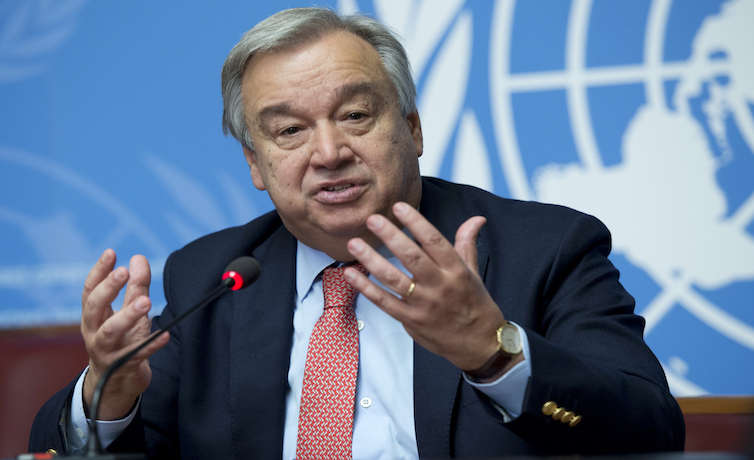WORLD
UN charter @ 76: Guterres underscores importance of upholding human rights

UN Secretary-General, Antonio Guterres, has emphasised the importance of upholding fundamental human rights and to maintain international peace and security.
Guterres said this in his message to mark the 2021 UN Day, celebrated on October 24 to remember the official creation of the United Nations.
He underscored the importance of “securing and upholding the rights and dignity of all people”, especially the poorest and most disadvantaged girls and women, children and young people.
The secretary-general pointed out that 76 years ago, the UN was created as “a vehicle of hope for a world emerging from the shadow of catastrophic conflict”.
“Today”, he added, “the women and men of the UN carry this hope forward around the globe”.
The UN chief observed that while COVID-19, conflicts, hunger, poverty and the climate emergency remind us that our world is far from perfect, they also make clear that “solidarity is the only way forward”.
“We need to come together to tackle great challenges and advance the Sustainable Development Goals (SDGs).”
Guterres said this could be done by ensuring that every person, everywhere, has access to COVID-19 vaccines “sooner rather than later” and by seeking an end to the “conflicts that scar our world”.
According to him, the values of peace, development, human rights, and opportunity for all, which have for the last 76 years powered the UN Charter, “have no expiry date”.
“As we mark UN Day, let’s unite behind these ideals, and live up to the full promise, potential and hope of the United Nations.”
Meanwhile, from bringing together fractured communities, to fighting child labour, and advancing climate action, the work of UN staff around the world is contributing to progress and development in many different ways.
To mark the Day, UN featured the diverse contributions made by former staff members in Brazil, the UN team in the country celebrated the occasion by highlighting the contributions of four staffers.
The four former staffers had played a role in the Organisation’s history: a veterinarian, an environmentalist, a sociologist, and a demographer.
All of them have dedicated a large part of their lives to the UN, in the belief that unity and dialogue are the best way to bring about a fairer and more sympathetic world.
“The world after the pandemic will be different – the planet was forced to take a break, and a new world will come out of that.”
This philosophical take on COVID-19 comes from a former UN staffer who has earned the right to provide a long-term view.
After all, this is the second pandemic he has lived through. Now 105-year-old, Milton Thiago de Mello was a small child when Spanish flu was spreading around the world, killing tens of millions of people.
As well as surviving that global health crisis, Thiago de Mello lived through two world wars, and travelled to many cities and countries, working tirelessly in the service of scientific progress.
His research on brucellosis, an infectious disease that affects livestock and human health, brought him to the attention of the Pan American Health Organisation and the World Health Organisation (PAHO/WHO), for whom he began working in Argentina, during the year the health agency was created, in 1948.
Cristina Montenegro’s international UN career spanned three decades, and by the time she retired she was the head of the UN Environment Programme (UNEP) in Brazil, one of the first women in the Organisation to run an agency country office.
After working at the United Nations Conference on Environment and Development (better known as the 1992 Earth Summit, in Rio), the environmentalist went on to serve in Mexico, before returning to Brazil to open the first UNEP country office.
“We started in a period when little was said about the environment,” she reminisced.
“Then we had a boost in 1992 with the Rio Conference, which strengthened the theme and institutions.”
João Carlos Alexim ran the Brazil country office for another UN agency, the International Labour Organisation (ILO).
During his career, he was involved in some pioneering projects, including initiatives that advanced the fight against child labour, and improving equal opportunities and salaries for Black and women workers.
“For me, the United Nations remains the fundamental organisation centre for human thought and civilisation,” he says, emphasising the values that founded the UN, which remain relevant today.
Ms Mena Mueller, during his time as the head of the emergency office of the United Nations Educational, Scientific and Cultural Organisation (UNESCO) in Bosnia, participated in negotiations to end the war in the country that killed more than 97,000 people.
Mueller was tasked with the complex mission of uniting the three conflicting groups (Bosnians, Croats, Serbs), with a shared cultural identity.
This involved mobilising artists, journalists, activists and educators, to prove to the people of the former Yugoslavia, and the outside world, that the countries and historic cultures needed to be supported.
“When we arrived in the country, it was difficult to convince people that they weren’t dead. Especially young people”, she says.
“It was a huge job to encourage them to go on and to find enough hope to build meaningful lives”.




 Davido's Net Worth & Lifestyle
Davido's Net Worth & Lifestyle 
